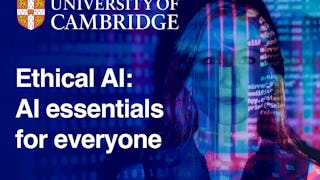The course "Practical Methodologies and Ethics in AI" equips learners with the essential skills needed to build, evaluate, and deploy deep learning models, while also addressing critical ethical considerations in AI. Through hands-on projects and case studies, you’ll explore the practical methodologies used to train models effectively, troubleshoot issues, and apply structured probabilistic approaches to manage uncertainty. A key highlight of the course is its emphasis on ethics, enabling you to identify and address bias, fairness, and societal implications throughout the AI lifecycle. By integrating structured probabilistic models with deep learning, you’ll gain the ability to create robust, interpretable AI systems that tackle real-world challenges.


Practical Methodology and Ethics in AI
This course is part of Foundations of Neural Networks Specialization

Instructor: Zerotti Woods
Included with
Recommended experience
What you'll learn
Learners will gain hands-on experience training and debugging deep learning models while considering deployment challenges and best practices.
Students will understand and evaluate ethical concerns in AI, including bias, fairness, and the societal impact of deploying neural networks.
Learners will explore how to integrate structured probabilistic models with deep learning, reducing uncertainty and improving model decision-making.
Skills you'll gain
Details to know

Add to your LinkedIn profile
6 assignments
See how employees at top companies are mastering in-demand skills

Build your subject-matter expertise
- Learn new concepts from industry experts
- Gain a foundational understanding of a subject or tool
- Develop job-relevant skills with hands-on projects
- Earn a shareable career certificate

There are 4 modules in this course
"Practical Methodology and Ethics in AI" focuses on teaching essential skills in dataset exploration, training deep learning models, and deploying them, with a strong emphasis on ethics in the AI lifecycle. The course covers identifying and addressing bias and fairness issues and integrating probabilistic models with deep learning to manage uncertainty. This course provides a solid foundation in both technical and ethical aspects for responsible AI development.
What's included
2 readings
This module will discuss practical methodologies for training Deep Learning Models. Students will explore case studies along with different situations to apply previous and new knowledge in the process of training and deploying Deep Learning Models.
What's included
1 video1 reading2 assignments
This module will discuss ethical considerations for Deep Learning Models. You will explore nuances of ethics and the use of machine learning to make decisions.
What's included
1 video1 reading2 assignments
This lesson delves into the intersection of structured probabilistic models and deep neural networks, highlighting how probabilistic frameworks can be integrated with Deep Learning to model uncertainty, learn from incomplete data, and provide interpretable AI systems.
What's included
1 video1 reading2 assignments
Earn a career certificate
Add this credential to your LinkedIn profile, resume, or CV. Share it on social media and in your performance review.
Instructor

Offered by
Explore more from Machine Learning
 Status: Preview
Status: PreviewJohns Hopkins University
 Status: Free Trial
Status: Free TrialFractal Analytics
 Status: Preview
Status: PreviewUniversity of Cambridge
 Status: Preview
Status: Preview
Why people choose Coursera for their career





Open new doors with Coursera Plus
Unlimited access to 10,000+ world-class courses, hands-on projects, and job-ready certificate programs - all included in your subscription
Advance your career with an online degree
Earn a degree from world-class universities - 100% online
Join over 3,400 global companies that choose Coursera for Business
Upskill your employees to excel in the digital economy
Frequently asked questions
To access the course materials, assignments and to earn a Certificate, you will need to purchase the Certificate experience when you enroll in a course. You can try a Free Trial instead, or apply for Financial Aid. The course may offer 'Full Course, No Certificate' instead. This option lets you see all course materials, submit required assessments, and get a final grade. This also means that you will not be able to purchase a Certificate experience.
When you enroll in the course, you get access to all of the courses in the Specialization, and you earn a certificate when you complete the work. Your electronic Certificate will be added to your Accomplishments page - from there, you can print your Certificate or add it to your LinkedIn profile.
Yes. In select learning programs, you can apply for financial aid or a scholarship if you can’t afford the enrollment fee. If fin aid or scholarship is available for your learning program selection, you’ll find a link to apply on the description page.
More questions
Financial aid available,

